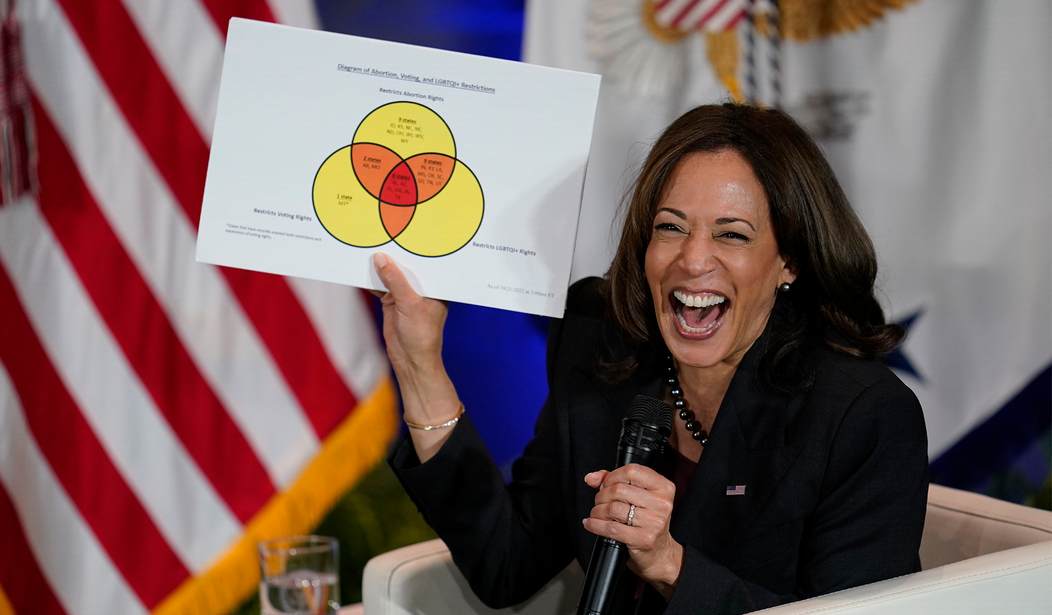Monday is Kwanzaa so it’s time again for a pandering story from Kamala Harris about how she celebrated Kwanzaa as a child with all the elders and “generations” coming together for a holiday.
When I was growing up, Kwanzaa was a special time in our home. Today, my family and I are reflecting on the seven principles. Happy Kwanzaa! pic.twitter.com/w1pFOIUU9G
— Vice President Kamala Harris (@VP) December 26, 2022
Harris stated:
“Doug and I send our warmest wishes to all of you this holiday season. Growing up, Kwanzaa was always a special time. We came together with generations of friends and family and neighbors. There were never enough chairs. So my sister and I and the other children would often sit on the floor and together we lit the candles of the Kinara. And then the elders would talk about how Kwanzaa is a time to celebrate culture, community, and family. And they, of course, taught us about the seven principles. My favorite principle was always the second — Kujichagulia. Self-determination, the power to design your own life and determine your own future. And it is a deeply American principle, one that guides me every day as Vice-President.”
You can see Doug Emhoff’s mouth movements as she talks about the generations getting together which makes me wonder if he knows/thinks this part of the story is bull cookies.
The video got a lot of responses from people who doubted the story and believed that she was pandering.
I love you VP, I really do. But come on … you don’t really expect people to believe this, do you?
— ☺️🇯🇲🇨🇦 (@_nadelizabeth) December 26, 2022
As my colleague Jennifer Van Laar pointed out previously, it was an unlikely story given that Kamala was born in 1964 and Kwanzaa wasn’t invented until 1966, then not widely celebrated until much later, so it was improbable that “generations” would have been so attached. On top of that, her Jamaican father divorced her Indian mother in 1971 and her Indian mother had custody of her. When Kamala was in middle school, she moved to Canada with her mother.
However, as some noted, if the Kwanzaa story was true, it might be more problematic, given the timing. She grew up in the Berkeley/Oakland area, which was a hotbed of radicalism at the time. Her sister said that “experience and relationship with blackness is through being raised in these communities in Berkeley and Oakland, and not through the lens of being Caribbean.” If she was being taught about it as a little child (i.e. late sixties), she might have been getting a radical slice of it.
Kwanzaa was initially pegged as an alternative to Christmas, which Karenga believed “stood in the way of Black cultural advancement,” historian Keith Mayes wrote in his book, Kwanzaa: Black Power and the Making of the African-American Holiday Tradition. But as the holiday gained popularity in the 1980s and 1990s, Karenga relaxed his stance so as to avoid alienating religious Black people. “Kwanzaa was not created to give people an alternative to their own religion or religious holiday,” Karenga said in his 1997 book, Kwanzaa: A Celebration of Family, Community, and Culture.
That’s why many in the 70s weren’t celebrating it, particularly religious families, and because of the radical origins of its founder, Maulana Karenga, who was a black nationalist who had been convicted of felony assault, torture, and false imprisonment of women in 1971. He only served a few years for that and got out in 1975, going on to become a professor, and now the chair of Africana Studies at Cal State, Long Beach.
But maybe Kamala is trying to catch up to Joe Biden with creatively-embellished history. At least she said “Kwanzaa,” as opposed to House Speaker Nancy Pelosi (D-CA) who called it “Schwanzaa.” If you’re going to pander, at least get the name of the holiday correct.













Join the conversation as a VIP Member